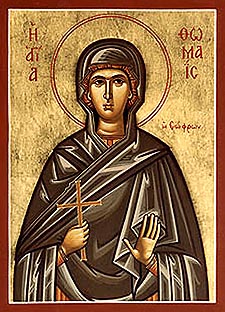|
|||
|---|---|---|---|
| This weekly bulletin insert complements the curriculum published by the Department of Christian Education of the Orthodox Church in America. This and many other Christian Education resources are available at http://dce.oca.org. | |||
|
The Resurrection of Our Lord Jesus Christ gives us salvation and eternal joy. But it is always beyond our human ability to "understand." The first two days of Bright Week commemorate events that offer other examples of the limits of human understanding. In all these events God is working for us, but people fail, at least at first, to see what He is doing. During these days we read the story of Christ's encounter with two apostles on the road to Emmaus (Luke 24: 12-35). These two apostles, who knew Him and are actually in His presence, not only don't recognize Him, but are sure that His death meant the end of all their hopes. So Jesus must ask them, "Was it not necessary that the Christ should suffer these things and enter into His glory?" He even calls them "foolish" and "slow of heart to believe all that the prophets have spoken." God's plan was laid out in the Old Testament prophecies, yet even the apostles do not immediately see its fulfillment in Jesus Christ. Once these two who meet Him on the road see Him break bread, they come to understand. During these days we read Acts 1: 12-17, the testimony of John the Baptist concerning Jesus Christ. We also read verses 21-26, and we see once again the failure of human understanding. John is peppered with questions: "Who are you?" "Are you Elijah?" "Why are you baptizing, if you are neither the Christ, nor Elijah, nor the prophet?" John tells them of the One whose sandal he is not worthy to untie, whose way he was sent to prepare. That role of preparation, of being the forerunner, is what God has planned for him. Soon after, some of John's followers will meet Christ, and they will understand. Also in the spring, we remember Saint Thomais, a young Christian woman of Alexandria. Her husband was a fisherman, and often was away from home on his fishing boat. One night when her husband was absent, her father-in-law was overcome by passion and tried to force her to have sexual relations with him. She resisted, reminding him of God's Law. He became so enraged that he grabbed a knife and killed her. Saint Daniel of Scetis, who was in Alexandria at the time, heard about this and told the monks to bring the young woman's body to the cemetery of a nearby monastery, to be buried with the departed monks. Again, a question revealing limited understanding was asked by some of the monks: How can a woman be buried among our departed fathers? Daniel replied: "She is my mother and your mother, because she died for her chastity." 
In time, the monks came to understand. Those among them who were tormented by lustful passions were directed to pray at her grave, and received healing and relief. What events will come into our lives as part of God's plan? Will we question them? Or perhaps we will be ready to accept the answer to all questions: Christ is Risen! |
|||
